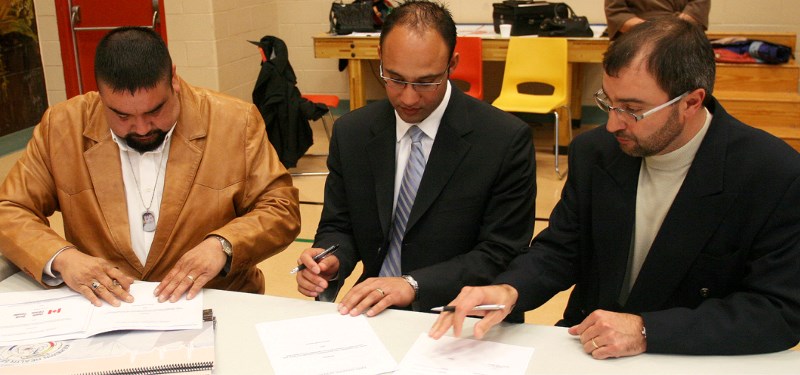The sharing of data and information between six chiefs of First Nations, Health Canada and Alberta Health Services was formalized Oct. 28 and is expected to improve reserves' services such as emergency services, construction planning and water safety.
The shared information includes maps, GPS coordinates, land surveys, health information and more.
The agreement was signed by Chief Ernest Gadwa of Kehewin Cree Nation and chairperson for Tribal Chiefs Ventures, Rob Barone, director of contract operations for Alberta Health Services and Simon Sihota, regional environment health manager for Health Canada at a Tribal Chiefs Ventures meeting at the Bonnyville Indian-Metis Rehabilitation Centre. Gadwa signed on behalf of the five other chiefs in attendance who represented Cold Lake First Nations, Frog Lake First Nations, Heart Lake First Nation, Beaver Lake First Nation and Whitefish Lake First Nation #128.
“The chiefs are very excited about this and want to move forward with it immediately,” said Gadwa of the agreement.
Emergency responders, including fire, police and ambulance have voiced their concerns over the inability to find specific homes on the reserve, due to lacking or non-existent maps, as well as non-corresponding house numbers. Conversely, those living on the reserve have been concerned with response times and see this new agreement as something that could remedy that.
Sihota explained that Health Canada has a mandate to oversee drinking water on reserves and has been collecting geographic water data for years. This data will now be included in a large database that all services and people living on the reserves can access.
Sihota said water safety is just one small component. “We've collected some data, but we didn't have the complete picture…and it was the initiatives of the chiefs to get that complete picture,” he said. “(Health Canada) provided our piece of the puzzle, and they've collected the other pieces of the puzzle…now we're all able to work from that larger database.”
Information was constantly updated and added to even prior to the signing of the agreement. Gadwa explained that some reserves were already out on their horses mapping fence lines and property lines to add to the database.
“It's a working document, it's always going to be added to and updated,” he said.
Gadwa had no doubt this agreement will enhance all services on the reserve.
Alberta Health's Barone, who is also a paramedic, said, “The initiative is obviously going to have a positive impact on how we deliver our services,” adding, “The highest trained practitioner, with all the equipment in the world, is not going to make an ounce of difference if they can't get to the emergency.”
“It's a win-win situation for everyone,” said Sihota.



